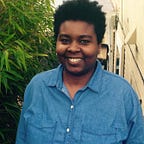I Yearn for Safe Havens
… there is a difference between voicing and healing, between surviving and thriving. I have more recently realized how much thriving and healing is a community act given the generational and cyclical trauma I face as a Black woman.
I want to go where my skin doesn’t crawl
a place to let a smile rise through pits of angst
I want to be where my shoulders hang low
like weights, compressed from group hugs
I am Black in this dreamscape
I am blues and (re)fuses…
I’ve been reflecting on safe havens, places where my breaths are not rushed and where my being is not attacked. I’ve needed them for all my life; I am just more conscious of this need now. In my clubbing days, I found safe havens within Chicago house music bass and drums. I found love within dancehall riddims as a DJ and spectator. I found acceptance at drag shows and other queer spaces. I conversed with my ancestors through steady bass lines and screaming guitar riffs at blues clubs. Now, as an introvert and mother, I more frequently find refuge in my daughter’s voice, in her safety, in our laughter together. I find solace in nature, in outside air when my breaths are temporarily deep, calm, freeing, and I am just a being in community with all beings.
I write this on the day that Ahmaud Arbery’s murderers have been found guilty. Only now, as I write and reflect on safe havens, do I let myself feel the repetitious sorrow from premature Black death in society. I think over the years, I’ve allowed the blank page to be a version of a safe haven. And here I pour. When I heard the verdict read in Ahmaud Arbery’s trial, I felt numb — stuck in between relief, horror, profound disgust, and mourning. My body felt stuck in a whiplash of shocks. Just last week, I felt an inner voice speak to me, “You are less safe.” This voice started when I walked out of my home hours after the not guilty verdict in Kenosha, Wisconsin. I still find refuge in the page — in the ability to voice what I often can’t find the words to speak. But there is a difference between voicing and healing, between surviving and thriving. I have more recently realized how much thriving and healing is a community act given the generational and cyclical trauma I face as a Black woman. I yearn for safe havens.
The pandemic has been a catalyst for me to reflect on my own mental health. I don’t want to return to the normal I knew before the pandemic. The truth is, I have found freedom in saying I wasn’t okay. This admission has shown me a new way to advocate for myself and the possibilities in refusal. I’ve found inspiration in Black women increasingly talking about mental health. Naomi Osaka’s refusal was inspiring, but I have found strength in everyday Black women making career shifts, choosing family, and choosing self. These collective refusals gave me push to make decisions about my own life that put my well-being above capital gain or “successful” appearances. Now, on the other side of those decisions, I feel gratitude.
As I emerge into an unknown, cautiously, I feel the pulls to go back to normal. I feel the tugs to live complacent as a Black woman — to bear the brunt of oppression, pull myself up by my bootstraps, and get back to the “rat race”. And I refuse. I realize that the systems have not changed and won’t quickly. I do think that the way we approach life within the systems can change, however. We can stop looking at refusals as failures and can support each other in these refusals. We can try to ensure that our safe havens are not plagued by systems of white supremacy like competition. We can create spaces for imagining beyond the systems that reinforce violence against Black bodies. I know that I have more work to do and that there is more work to be done. As I learn and do work, I yearn for safe havens — regular pitstops on the oppressive terrain — for relief, for love, for Blackness, for exhales…
